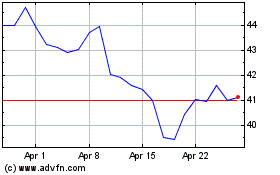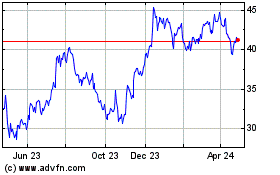New US Consumer Bureau Likely To Be Hobbled On Day One
June 14 2011 - 9:30AM
Dow Jones News
The U.S. consumer protection agency so central to last year's
financial-regulatory overhaul will almost certainly begin its life
temporarily hobbled, operating without a director or broad new
powers to prevent fraudulent and abusive financial practices.
The White House is struggling to install a director before the
Consumer Financial Protection Bureau officially opens its doors in
mid-July. Failure to get a confirmed director will represent a
significant--if short-lived--victory for the agency's fierce
critics.
Under the Dodd-Frank financial law, the agency must have a
confirmed director to gain many of its newfound powers, such as
policing non-bank financial firms like payday lenders. But politics
are complicating the White House's ability to get someone in place
in time for the deadline.
Without these powers, the agency touted by President Barack
Obama as "one of the central aspects" of Dodd-Frank, would be
weaker than intended, and it could spend its critical start-up year
facing legal questions about the scope of its powers.
Also, bankers and investors seeking more clarity about the new
regulatory environment would have to wait longer. Already, some
bankers are showing signs of fatigue with the partisan battle in
Washington. U.S. Bancorp (USB) Chief Executive Richard Davis, at a
banking conference on Monday, was upbeat about the future of
consumer banking but said he worries about the level of uncertainty
facing the industry.
"I want it to get up and running," he said of the consumer
bureau, adding that he wants the bureau to be able to regulate the
various non-bank lenders that compete with banks but largely escape
federal regulation. Even banks that opposed the creation of the
bureau considered the move to put non-banks under the same
regulatory umbrella as a positive for the banking industry because
it would level the regulatory playing field for all kinds of
financial firms. However, without a director, the bureau will not
have the authority to oversee non-bank firms.
The White House is considering tapping Raj Date, an ex-Wall
Street executive who is a top adviser to the bureau's chief
architect, Elizabeth Warren, to head the consumer agency. The
president's "goal remains to have a director in place by July 21,"
said a White House spokeswoman.
Republican senators have effectively blocked Obama's chance to
nominate a director, with 44 lawmakers saying last month they will
not confirm anyone as director unless structural changes are made
to the agency.
The White House, unwilling to concede to the changes, could
bypass the confirmation process and appoint a director while the
Senate is in recess. Such a move would spark controversy and
political observers say the administration likely will not do so
until it reaches agreement with Republicans over another
contentious issue--raising the federal debt limit. Also, senators
could try to use procedural moves to try to prevent the Senate from
recessing in July and August. Stifling the bureau would be a major
feat for GOP critics who have been fighting to blunt the agency's
powers and roll-back Dodd-Frank. The bureau's critics argue that
the agency is an unnecessary bureaucracy with too much sway over
banks. Consumer groups and liberals see the agency as much-needed
cop to protect families from banking tricks that spiraled out of
control in the run-up to the financial crisis.
Wayne Abernathy, an executive vice president at the American
Bankers Association, said there are "definitely legal issues if
there is no director" come July 21 but "there's disagreement as to
just how nasty the legal problems are." He added, "Our own belief
is that we're not sure there's much the bureau can do without there
being an officially appointed head." The industry group, a critic
of the bureau's "broad" authority, is concerned that the agency
will hurt banks with burdensome regulations.
A government report released in January said the consumer bureau
could still write certain rules and supervise banks and credit
unions that have more than $10 billion in assets but it couldn't
ban "abusive" financial practices or oversee pay day lenders and
other nonbank firms.
The Obama administration, which has been locked in crucial
battles with Congress over federal spending, has failed to formally
announce its pick to lead the fledgling agency. It's a silence that
has frustrated some of the agency's most vocal supporters,
including House Democrats and progressive groups, that want her to
head the agency.
But Warren, a consumer advocate who has battled banks on issues
related to bankruptcy and credit card practices for decades, has
also sparked Republican ire.
"Love her or hate her, Warren is still a polarizing figure on
Capitol Hill," said MF Global Inc.'s Jaret Seiberg. "The problem is
she's become the symbol of Dodd-Frank's overreaching."
Senate Republican Leader Mitch McConnell (R, Ky.) recently made
clear that the GOP is "pretty unenthusiastic about the possibility
of Elizabeth Warren" and equally unexcited about the new agency,
which he said "could be a serious threat to the financial
system."
On the other side of the issue, consumer groups, and even some
bankers, are urging Obama to act swiftly.
"They waited so long to nominate a director that they risk this
agency having its hands tied when it opens its doors," said
Consumer Federation of America Legislative Director Travis
Plunkett.
-By Maya Jackson Randall, Dow Jones Newswires; 202-862-6687,
maya.jackson-randall@dowjones.com
US Bancorp (NYSE:USB)
Historical Stock Chart
From Jun 2024 to Jul 2024

US Bancorp (NYSE:USB)
Historical Stock Chart
From Jul 2023 to Jul 2024
